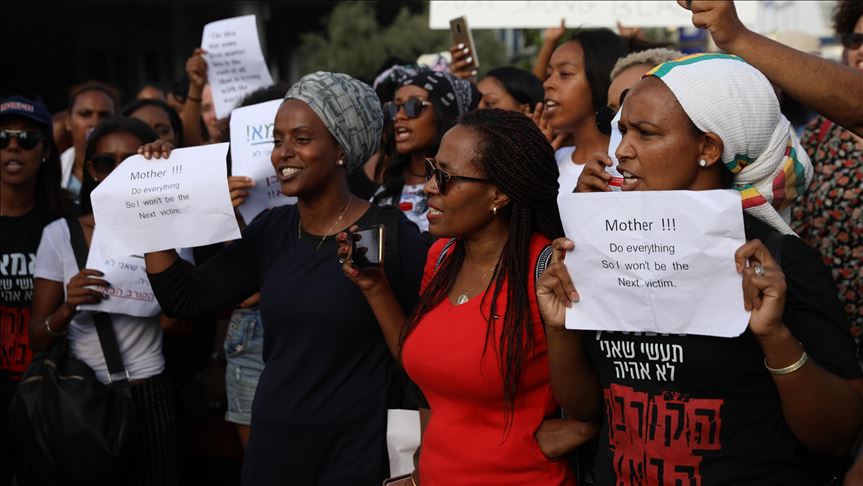Ethiopian Jews suffer racism in Israel
There are more than 140,000 Ethiopian Jews live in Israel
 Demonstrators stage a protest against the killing of Solomon Tekah, a young man of Ethiopian origin, who was killed by an off-duty police officer, near Azrieli Tower in Tel Aviv, Israel on July 08, 2019.
( Oren Ziv - Anadolu Agency )
Demonstrators stage a protest against the killing of Solomon Tekah, a young man of Ethiopian origin, who was killed by an off-duty police officer, near Azrieli Tower in Tel Aviv, Israel on July 08, 2019.
( Oren Ziv - Anadolu Agency )
JERUSALEM
The fatal shooting of an unarmed teenager of Ethiopian descent has rekindled complaints of racism and discrimination by Ethiopian Jews in Israel.
Solomon Tekah, 19, was killed by an off-duty police officer last week near Haifa, triggering demonstrations among Ethiopian Jews.
Demonstrators blocked roads and set tyres ablaze in several cities including Tel Aviv and Haifa amid clashes with police.
Israeli authorities said scores of policemen were injured and in the violence and that more than 100 people were arrested.
The disturbance, however, has highlighted complaints by Ethiopian-Israelis of systematic discrimination, racism and being treated as "second-class citizens" in the country.
For centuries, Ethiopian Jews were completely isolated from Jewish communities in other parts of the world.
But with the arrival of former Israeli Prime Minister Menachem Begin to power in 1977, the country's policy toward Ethiopian Jews changed.
Under Begin, Israel started to organize secret operations to relocate Ethiopian Jews to Israel.
By the end of the 1990s, around 80,000 Ethiopian Jews had arrived to Israel from the Horn of Africa country.
Now, there are more than 140,000 Ethiopian Jews live in Israel.
Discrimination
Upon their arrival in Israel, Ethiopian Jews faced appalling racism and discrimination from the Israeli establishment.
Many in the religious establishment even dared to question their Judaism.
One of the early incidents that exposed this approach was the revelation in the 1990s that the Israeli national blood bank had routinely destroyed blood donated by Ethiopian Jews for fear of HIV.
Ethiopian Jews also suffer from the highest poverty rate among the Jews in Israel, and suffer much higher levels of police stop-search, arrests and incarceration.
Unemployment among Jews of Ethiopian descent is also significantly higher than any other Jews in Israel.
According to a report by Myers-JDC-Brookdale Institute, the unemployment rate among Ethiopian women in 2000 was 63%. Although this percentage dropped to 26% in 2016, yet it still does not meet the desired percentage.
The unemployment rate for Ethiopian Jewish men also reached 20% in 2016, down from 38% in 2000.
Another notable point is the significant difference in the monthly income per household for Ethiopian Jews and other Jews.
According to the Myers-JDC-Brookdale Institute, the monthly income per household for Ethiopian Jews is 11,250 shekels, while for other Jews it is 15,575 shekels.
In 2016, 55% of Ethiopian Jewish children were enrolled in primary and secondary schools while the percent among other Jewish children is 77, according to the same institute.
Another report by the Ethiopian Jewish Association in Israel found that there was a 20% increase in the number of cases filed by the police against Ethiopian Jews in the same period, although there was a 6% drop in the cases filed by the police against all Jews in 2014-2017.
In addition, 90% of Ethiopian Jewish youth convicted by the court were sentenced to imprisonment, compared to one-third of other Jewish youth.
This all has left the Ethiopian-Israelis isolated and triggered protests in past years against what they perceive as racism and discrimination against their community.
According to Israeli media, 11 Ethiopians have died since 1997 in clashes with the police.
*Writing by Mahmoud Barakat








